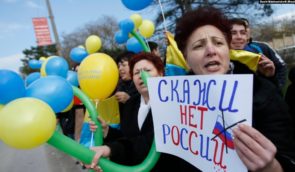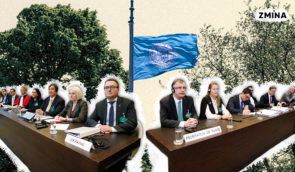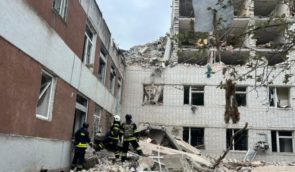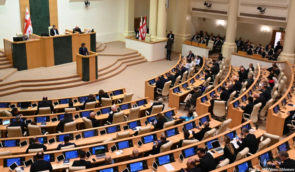Crimean Tatars Mark Anniversary Of Deportations
Crimean Tatars in Ukraine are marking the 71st anniversary of a mass deportation, ordered by Soviet leader Josef Stalin, which displaced around 200,000 people and cost many thousands of lives.
Organizers held a special event, called I Am A Crimean Tatar, in Holossivskiy Park in the Ukrainian capital, Kyiv, on May 18 to commemorate the deportation victims.
The commemoration was organized by Crimean Tatar activists and the Institute for Civil Society and Democracy Development.
Organizers said the gathering’s goal was twofold: to commemorate Crimean Tatars who died during the deportation to Central Asia that started on May 18, 1944, and to honor those who lost their lives during and after Crimea’s annexation by Russia in March last year.
Several tents were set up in the park for people to gather and take part in prayers and commemorations and hear the accounts of people who survived the Stalin-era deportation and have been forced over the past year to flee Crimea for other parts of Ukraine.
Mustafa Dzhemilev, a veteran Crimean Tatar leader and lawmaker, as well as a Ukrainian presidential envoy, told RFE/RL that a special concert to mark the deportation day was planned for Kyiv’s National Opera House along with an all-Ukraine rally of mourning on May 18.
Events commemorating the Crimean Tatar deportation have been held across Ukraine since May 16.
On May 14, Ukrainian lawmakers adopted a bill making May 18 a national Day of Commemoration of the Crimean Tatar Deportation.
Ukraine’s Education Ministry has recommended that schools across the country devote a lesson on May 18 to the history of the deportation of Crimean Tatars and the peninsula’s other ethnic groups to Central Asia.
In May 1944, Soviet dictator Josef Stalin ordered the expulsion of about 180,000 Crimean Tatars, who made up around one-fifth of the Crimean population, ostensibly over alleged collaboration with Nazi occupiers.
Tens of thousands of the deportees died during the journey or soon after their arrival in Central Asia.
Many deported Crimean Tatars or their children returned to Crimea in the late 1980s and the 1990s, but rights groups say they have faced discrimination and abuses since Russia seized the peninsula from Ukraine in March 2014.
Several Crimean Tatars have turned up dead since the internationally unrecognized annexation by Russia. More Crimean Tatars activists have been arrested, while Dzhemilev and Refat Chubarov, the chairman of Crimean Tatars’ self-governing body, the Mejlis, have been barred from entering Crimea by the peninsula’s Russian-installed leaders.
In April, Crimea’s Moscow-backed authorities shut down the only Crimean Tatar television channel and its affiliated media outlets.
Most Crimean Tatars appeared to oppose Russia’s annexation of Crimea from Ukraine, which came swiftly on the heels of occupation by Russian special forces troops and a hastily organized referendum.
Text: rferl, photography: Mykola Mirny, Human Rights Information Center






































